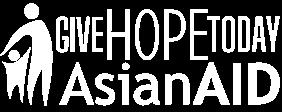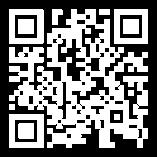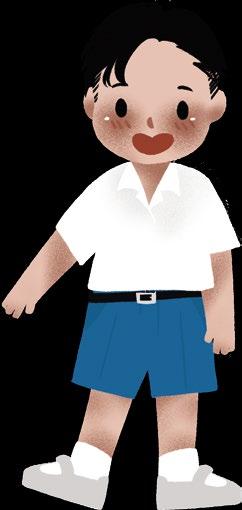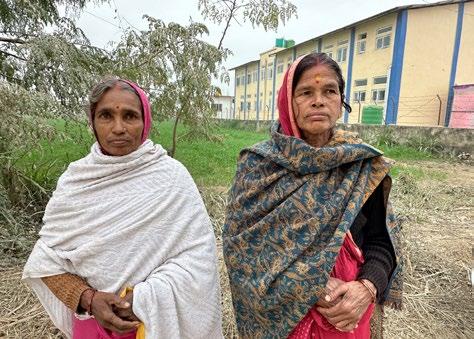


















Every school day, six-year-old Jannath eagerly gets ready to go to kindergarten.
Like most children her age, she loves playing with her friends and dreams of big things. “I want to be a nurse when I grow up,” she says proudly.
But what keeps Jannath in school isn’t just her love for learning—it’s also the warm, nutritious meal she receives during the day.
Jannath lives in a small village in Bangladesh with her mother, Salma, a housewife; her older sister Tanjila and her father Abu, who recently left for Saudi Arabia to support the family financially.
Salma recalls how difficult it was during her own childhood to attend school.
“The school was far away, and we often stayed home if we were hungry. Now, my children’s school is close by, and they get a meal there. That changes everything.”

For families like Jannath’s, the midday meals at school are more than a convenience, they’re a necessity.
“Sometimes we can't afford to eat,” Salma says. “But at school, Jannath knows she will get food. It helps us as parents and helps her stay focused.”
The mid-day mealtypically a balanced mix of rice, lentils, vegetables, and fruit - supports the overall well-being of the 67 students at the school. Most come from low-income families. The community has welcomed the program with open arms, recognising its impact not only on children’s health, but also on their attendance and academic performance.
The school was far away, and we often stayed home if we were hungry. Now, my children’s school is close by, and they get a meal there. That changes everything.
“We want Jannath to have a better life,” Salma adds. “We don’t want her to work in the fields or marry young. With school and good meals, she has a real chance.” School feeding programs like this one provide children with access to nutritious, affordable, and sustainable diets. They also encourage better care practices and promote positive attitudes toward education.
By providing school meals, you are investing in healthier children who are learning how to take care of their own well-being.
Please turn to the back page to help provide healthy meals for children who need them.



CHILDREN WITH THEIR MUM AFTER HER UTERINE PROLAPSE SURGERY.

“In my over 10 years with Asian Aid, I have visited many of our schools and communities. And what has struck me is the impact that Asian Aid has not only in education and sponsorship, but in the health space too. We are helping not only meet physical needs but also mental wellbeing, and I can see children thrive holistically.”

Midday meals Sports programs
-Ineka Martin, former nurse, Asian Aid’s Supporter Engagement Manager, and creative genius
SCAN/CLICK this QR code to see a short video introducing Ineka.

HOW THE PROGRAMS YOU SUPPORT ENSURE EACH CHILD'S TOTAL WELLBEING
Safe shelter
Mental health
Menstrual isolation awareness
Uterine prolapse care
Menstrual hygiene
Reproductive healthcare for young girls
Pre and post-natal care
Bangladesh
School health camps
Rural health camps
Clean water
Sanitation
Midday meals
Cambodia
Safe shelter
Nutritious meals
Bath and clean clothes
Trauma care
Clean water
Women’s health awareness

Midday meals
Clean clothes
Sanitary toilets


Livelihood for parents
Dental checks
Home gardens Eye checkups
Health checks for mum and dad
First aid training and kits
Menstrual and reproductive health
Sanitary products
Sports and well-being programs
Recently, one of the mums in Nepal who had an operation for uterine prolapse, met with our doctor and field worker during a health camp. She had undergone a successful procedure to treat a severe third-degree uterine prolapse. And she could hardly contain her happiness as she shared the profound relief and comfort she now feels following her surgery. "The surgery has transformed my life. I am no longer in pain and ashamed."




now. The first time she came, she discovered that she had third-degree uterine prolapse.
The following year, she returned with her young daughterin-law, who still only in her twenties, was also experiencing the discomfort of prolapse. This year, she brought her neighbour, Padma, on the right.
All three women have now received uterine prolapse surgery at Scheer Memorial Adventist Hospital. Your support has truly changed their lives. Thank you! *Not their real names.
During a visit to a school in Nepal, our partner staff noticed the toilets and pad disposal facilities were not well maintained. After an awareness session with adolescent girls, the students decided to take action—organising a roster to clean the toilets themselves and keep them hygienic. Empowered with knowledge, these young people didn’t just speak up—they led change to improve their own environment.
Mahira, 35 years old, Bangladesh: “I had very little knowledge about menstrual hygiene and management. Since the beginning of my period, I believed it was a curse. I used old cloths to manage my periods, which led to many health problems. But today, I learned new and safe techniques for maintaining hygiene — even while using old cloths. This knowledge will truly help me stay healthier.”
Umme, 27 years old, Bangladesh: “I was married off early, and after giving birth to my fourth child, I started facing various health issues. I used to think it was just a normal part of life. But after this seminar, I now understand that I need to see a doctor soon. If not, these problems could get worse — and costly. Sadly, my husband may not support my treatment expenses, but at least now I know the importance of getting medical help in time.”

"A big 'thank you' to our donors for their vital support in providing our clinic with a new ultrasound machine! This collaboration will empower us to deliver enhanced diagnostic capabilities and higher quality care to our patients, thanks to the machine's innovative features."


In many regions of Nepal, particularly in vulnerable border communities, women's health issues are often misunderstood or mishandled due to lack or limited accurate medical information and ethical healthcare services.

Myths about reproductive health persist, and in some cases, women are subjected to unnecessary medical procedures that have lifelong consequences.
Two young women, aged 24 and 27, attended our health camp seeking ultrasound evaluations for minor uterine concerns. They live in a border area between Nepal and India and had initially travelled to Bihar, India, for medical consultation. Unfortunately, they were misadvised to undergo hysterectomies—complete removal of their uteruses—despite the absence of a valid medical reason.
A common misconception persists in Nepal that removing the uterus is a cureall solution for various gynaecological
issues. Unfortunately, some healthcare providers and organisations exploit this misunderstanding and perform unnecessary hysterectomies without proper justification.
That is why, in our healthcare programs, we focus on uterus-preserving and reparative surgeries. Thanks to you, we are among the few in Nepal offering specialised procedures such as sacrospinous fixation (to restore support to the uterus) and anteriorposterior repair (repairs of the pelvic floor), and further train physicians from across Nepal to learn these advanced techniques.
We strongly oppose unnecessary hysterectomies and advocate for such procedures only when medically necessary and after thorough expert evaluation.

EDUCATION ABOUT SAFETY IS IMPORTANT

THE LINE IS LONG TO SEE THE DOCTOR AT A HEALTH CAMP


A REMOTE SCHOOL CAMPUS IS ALSO A HEALTH CAMP VENUE



CLASSROOM TURNS INTO AN OPTOMETRIST ROOM



READY TO TRAVEL TO HOSPITAL FOR UTERINE PROLAPSE SURGERY



LEARNING ABOUT MENTAL HEALTH YOUNG


the nearest healthcare centre?


Health awareness is a vital part of our child-focused projects. Through targeted sessions for children and parents, we help ensure children grow up in safe, healthy homes.
One recent session focused on first aid, equipping participants with practical, life-saving knowledge on how to:
• Recognise symptoms of injury, stroke, or heart attack
• Treat burns and assist with electric shock
• Identify broken bones
• Respond effectively in emergencies.
The training boosted participants’ confidence and gave them essential skills to care for others in critical moments.
Trained community volunteers discuss health and hygienerelated topics regularly at courtyard meetings. And community seminars address sensitive or complex health concerns. In this way, mothers are empowered with knowledge, awareness, and the confidence to take charge of their health:
1. Menstrual hygiene and management
2. Nutritional needs during adolescence and pregnancy
3. Early signs of infections and when to seek medical support
4. Breaking taboos and misconceptions around female health.
Twenty new mothers received neonatal baby kits which included essential items such as sanitary materials, baby food, baby bedding, and other supplies to help with infant care and maternal well-being. Parents also participated in a short awareness session before receiving the kits where they learned about:
1. Proper childcare practices and basic hygiene
2. The importance of exclusive breastfeeding
3. The need for regular check-ups, vaccinations, and timely medical intervention for infants.
“This is my first child, and the expectations from my husband and his family are very high. I had asked my husband several times to bring these necessary items for our baby, but he didn’t pay attention. He even refused to take our child for vaccinations, saying it would be too expensive. But today I’ve learned that many essential vaccines are provided free by the government. I’m truly thankful to the donors for not only providing these materials, but also empowering me with this important information,” said Samia, one of the recipients.

I WOULD LIKE TO PROVIDE
m School Lunch for one child for a week ($10)
m Hygiene Pack for one girl ($20)
m New Mum's Care Pack for one mum ($35)
m 'Healthy Me' Check for children and parents ($60)
m Emergency Care Kit for children and parents ($90)
m Operation for a Mum to heal from uterine prolapse ($500)
m Any amount will help keep a child healthy $
This is a m one-off donation m monthly donation
I WILL GIVE MY DONATION BY:
CHEQUE Make payable to Asian Aid Organisation and post with this form.
FUNDS TRANSFER Call us on (+61) 02 6586 4250 for banking details
CREDIT CARD
Name on Card
Expiry ____ /____ /____ CSV Amount
Signature Date____ /____ /____
m
